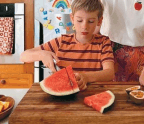forget- me-not

What’s your background?
I’m a lawyer, and I work at Griffith Law School as a lecturer. I’ve been here since 2004, the same time as I started the orphanage. I mostly teach postgraduate law students. Part of my job is to research and do good service in the world.
You’ve always been interested in volunteering. How did this translate to starting your own orphanage?
At uni I did a lot of local stuff, like soup kitchens and tutoring refugees—things that were within my own community. Then a friend went to Nepal to do orphanage volunteering. He came back really moved and wanted to start his own orphanage. By that stage, I’d finished my law degree, so we figured out how to start an organisation in Australia that could support an orphanage in Nepal.
Lo and behold, it wasn’t very hard. All of a sudden, we were responsible for six children in Kathmandu. My friend was twenty-one and I was twenty-three, and both of us had no real context for caring for vulnerable children.
Obviously now, with great reflection, there’s no way we could do that in Australia. But none of that really occurred to us. We had a real cognitive dissonance going on—and, I suppose, a bit of that ‘white saviour’ mentality. The solution seemed obvious: we’ll just run an orphanage that’s above board and that provides great opportunities for these children.
We got a few years in and then took on an orphanage in Uganda where the children were in dire straits—they were starving. We went there on a scoping mission, to see what was happening. The children had distended bellies, they were malaria-ridden, and they were having two teaspoons of sugar in water for lunch.
Were you living there at the time?
We never lived in our Nepal orphanage. We were ‘best practice’, so we were essentially funding that orphanage. But we had local caregivers. We didn’t have volunteers onsite because we knew that their rotation in and out would be harmful for the children long-term.
I’d worked in childcare when I was going through law school, so I had a basic understanding that you should have one staff member to every four kids. You should have continuity of care. We should focus on the local caregivers, who have appropriate language and culture, and they should be responsible for the children’s upbringing, not us. We had figured out those basic things. But we didn’t understand what was really happening—and our eyes were opened in Uganda.
What happened to the orphanage?
You’re reading a preview, subscribe to read more.
Start your free 30 days



